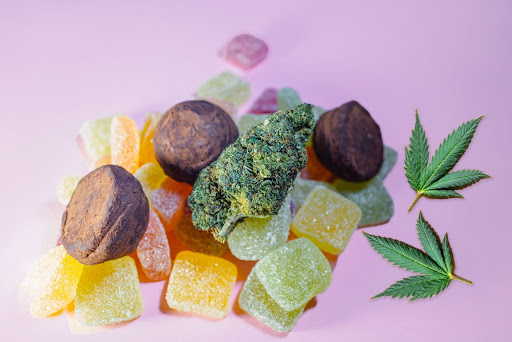
The growing popularity of marijuana edibles has led many to question how long these cannabis-infused food products, like THC gummies and cannabis-infused chocolate, remain in the body and how they impact drug testing. The answer isn’t a single number; it’s a complex equation with many variables. Understanding the journey of THC from a delicious edible through your body’s endocannabinoid system is key to grasping why detection times can vary so dramatically.
THC edibles can be detectable for days to months, depending on the drug test, your physiology, and frequency of use. Unlike smoking, edibles are processed by the digestive system, leading to a different metabolic pathway and longer effects. Keep reading to learn exactly how edibles interact with your body and how long you can expect your next THC gummy to be detectable in a drug test!
The Science of Edibles: First-Pass Metabolism
When you smoke cannabis, the psychoactive cannabinoid delta-9 THC enters the bloodstream directly through the lungs, resulting in a fast onset of effects. With edibles, the process is different. After consumption, the active ingredients are broken down in the digestive system. The THC then travels to the liver, where it undergoes first-pass metabolism, a crucial step that differentiates edibles from other forms of cannabis.
How Your Body Processes THC Edibles
During liver metabolism, the liver converts THC into a more potent metabolite: 11-hydroxy THC. This metabolite is responsible for the intense and long-lasting effects of edibles. After the high subsides, the body continues to metabolize THC into other byproducts, collectively known as THC metabolites. These metabolites are fat-soluble and are stored in fat cells, slowly releasing over time and prolonging their detection window.
Experience the effects of THC edibles for yourself
Explore our range of edibles here
Drug Testing Detection Times: How Long Do Cannabis Edibles Stay in Your System?
The most important factor in how long edibles stay in your system is the type of drug test being administered. Each method has a different detection window.
Urine Tests
This is the most common type of drug testing. For a single-use or occasional user, THC metabolites can be detected in a urine test for approximately 3 to 7 days. For chronic users (those who consume frequently, even daily), the detection window can be significantly longer, ranging from 30 days to sometimes even longer. This is because the buildup of THC in fat cells in chronic users is much greater, leading to a slow, continuous release of metabolites into the urine. (N. Schlienz et al., 2018)
Blood Tests
Blood testing is used to detect very recent drug use, as THC is only present in the bloodstream for a short time. THC can typically be detected in a blood test for a period of 2 to 12 hours after use, but can be detectable for up to 30 days in chronic users. Blood tests are not a common method for general drug screening due to this short detection window. (Tory R. Spindle et al., 2020)
Saliva Tests
Similar to blood tests, saliva testing is used for recent use. THC can be detected in saliva for about 1 to 3 days after consuming an edible. The short detection window makes it a popular choice for roadside or post-incident testing. (R. Vandrey et al., 2017)
Hair Tests
The hair test, or hair follicles test, has the longest detection times of all methods. Hair testing can detect the presence of marijuana metabolites for up to 90 days. As THC circulates in the body, trace amounts get trapped in the hair shaft as it grows. This provides a long-term record of drug use, making it an effective tool for identifying patterns of long-term use rather than a single instance. (H. Khajuria et al., 2014)
Factors That Influence the Detection of Marijuana Edibles in Your System
While the type of drug test is a significant factor, several other variables affect how long THC from edibles remains in your body.
The Main Variables Are:
- Frequency of Use: This is arguably the most crucial factor. An occasional user who has a single THC gummy will have a much shorter detection window than a chronic user who regularly consumes marijuana-infused food products. The accumulation of THC in fat cells over time is the primary reason for this difference.
- Dosage and Potency: The more potent the cannabis edibles and the higher the dose of THC (tetrahydrocannabinol) you consume, the longer it will take for your body to metabolize and eliminate the compounds.
- Metabolism and Body Fat: Your individual metabolism plays a huge role. A person with a high metabolism will process and excrete THC faster than someone with a slower metabolism. Since THC is fat-soluble, a person’s body fat percentage is also a major factor. Individuals with more body fat will store more THC, leading to longer detection times.
- Hydration and Diet: While there are no magical “detox kits” that can instantly remove THC from your system, staying well-hydrated can help. Drinking plenty of water can help dilute the concentration of THC metabolites in your urine, which may be beneficial for a urine test, but it won’t eliminate the THC itself.
It is important to remember when ingesting weed gummies, cannabis chocolate, marijuana drinks or any other edible, that everyone reacts differently!
The Difference Between THC and CBD
It’s important to note the difference between THC and CBD. While both are cannabis compounds, only THC produces psychoactive effects. CBD edibles are becoming increasingly popular for their non-intoxicating properties.
A drug test that specifically looks for THC will not detect CBD. However, some CBD products, especially those derived from full-spectrum cannabis extracts, may contain trace amounts of THC. This could potentially lead to a positive result on a sensitive drug test, so it’s essential to be aware of the product’s contents.
Explore our range of THC and CBD products
How Long Do the Effects of Weed Edibles Last?
The psychoactive effects of marijuana edibles can last significantly longer than other consumption methods. After the initial onset, which can take anywhere from 30 minutes to two hours, the effects build slowly. Peak effects typically occur 2-4 hours after consumption.
These prolonged effects are due to the way cannabis edibles are processed by the body, where THC is metabolized by the liver before interacting with your brain’s cannabinoid receptors. The overall duration of the high can last from 6 to 12 hours, with some residual effects lasting even longer.
Want to experience the effects of weed edibles? Find the perfect product here!
Plant Base: Your Premier Partner for Weed Edibles in Plainfield, New Jersey
At Plant Base NJ, we’re building a different kind of cannabis experience. We believe in providing a safe and welcoming space for everyone, from the curious newcomer to the seasoned connoisseur. Our focus is on carefully curated, quality products and a commitment to helping you find what’s right for your needs. We’re more than just a store; we’re a hub for community, education, and wellness. Come see us and discover the difference.
